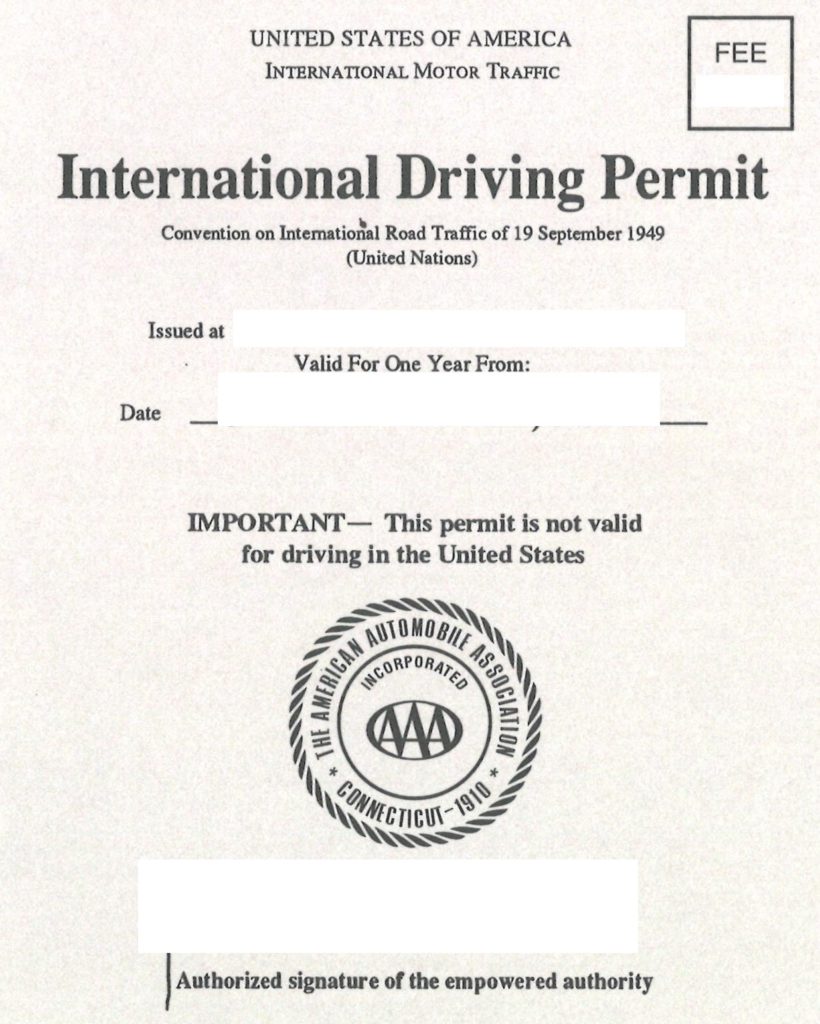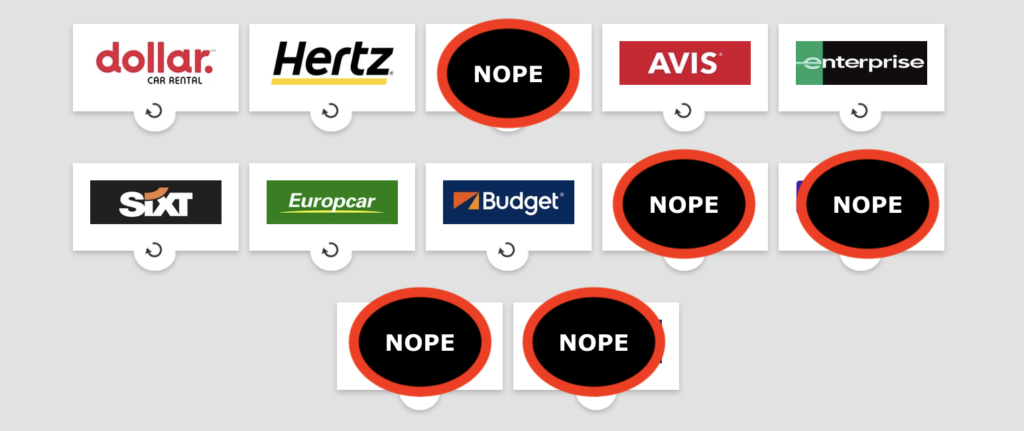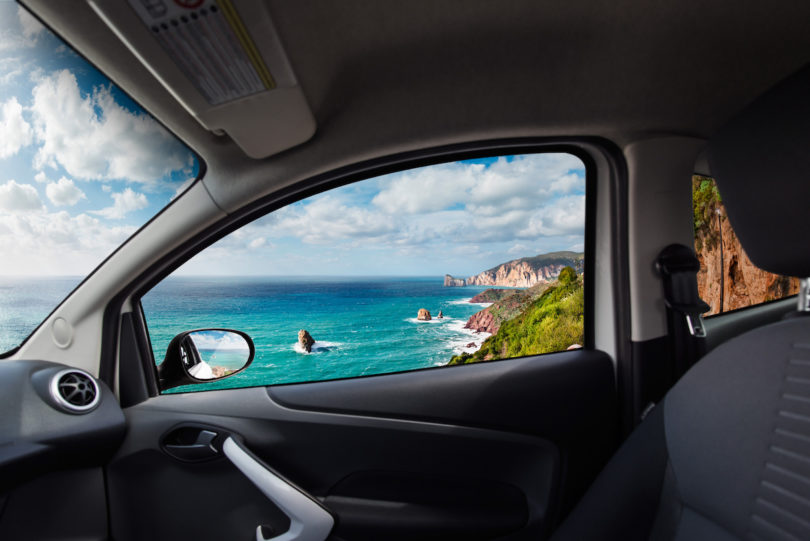While many people prefer to not deal with driving on vacation, there are many others that like to have control over their journey – you know, to stop wherever they want to stop, to drive around and see various parts of the country, to visit someplace or someone on a whim. To do that in Greece, you will need to drive a car so here are 8 things you should know about driving and renting a car in Greece.
8 Things to Know About Driving and Renting a Car in Greece
You Need to Have an International Driver’s Permit
While many countries will say you need to have an international driver’s permit, your state issued driver’s license is often enough and the rental agencies will often not even ask about the permit. But, a few years ago, this changed in Greece and now you are not allowed to rent a car in Greece without having an International Driver’s Permit.
I will say this – if you have an EU driver’s license, you do not need an International Driver’s Permit! This first step is something written in mind for the US readers of this blog who do need an IDP!

If you do not have one, the agency can be fined thousands of euros and you can be fined as well. So, the rental agencies will not even rent to you (though you may find one or two that may not care but that does not mean you do not need one!). In fact, I have found agencies to be more concerned about this than even your real driver’s license or passport!
Check this post for more information about International Driver’s Permits
Only Rent from Larger, Well-Known Companies
This one I kind of feel bad saying because I know there are dozens of smaller agencies that are trying to make it work and make a living in a tourism-based economy. However, I have had (and heard of) enough situations with smaller companies that I have learned to avoid them.

Stick with the larger, more reputable car rental companies
This tip can even apply to renting cars anywhere in Europe! There are several reasons but here are some of my biggest ones.
Insurance Shenanigans
Many low cost car rental companies do hard sells on insurance (in the US like the pretty bad Payless) so it should not come as a surprise to you in Europe. However, remember that you credit card rental policy may require a police report that is not always easy to come by in some countries!
Some of these companies take advantage of that difficulty in obtaining reports by charging exorbitant rates for insurance. It can make a car that costs just $5 per day cost $40 per day! I have seen some very shady tactics at some of these companies so I try to avoid them and stick with the larger, more well-known companies – even if it costs more. Sometimes, it is very much a pay-now-or-pay-later scenario.
Condition of Vehicle
Another reason to go with larger companies is with the condition of vehicles. Some of the cheaper rental companies do not do maintenance very well on the vehicles or they are much older than regular rental vehicles.
I rented a vehicle in Jordan (I know it is not in Europe!) one time that was old, rickety, and burned oil like crazy. I would have been better off renting something for an extra $50 – 80 that would have been more reliable!
Shady Tactics on Return
I have also found that these cheaper companies often try to wave you off on scratches and such when you are renting the car and then try to use those scratches upon return as a reason to charge you in excess of €1,000. Yes, this is tried often at many smaller agencies.
If you really want to rent from the lesser-known places, get your phone out and put it on video as you do a walk-around with the agent and ask about each and every scratch. You should take photos of your vehicle before you drive off anyway but by taking video of the walk-around, you at least have some evidence of what their agent said when you drop it off.
Make Sure You Use a Credit Card with Rental Insurance Coverage AND a High Credit Line!
I had this happen this year (and from a larger company so make sure you read the fine print!) and I know this happens at small agencies and large ones so make sure you are ready! We rented a 7 passenger van and I checked the contract I received ahead of time to be sure of what the security deposit was. It said it was €320 however, I was hit with another €2,400 in security deposits when I showed up to pick up the van we were renting for 3 days. The total blocked on my card was over €3,000 for a €220 rental!
I know blocking an amount on a card is normal practice outside of the US but normally the company will tell you in the reservation e-mail. In this case, they insisted that it was what their system required and that the €320 amount mentioned in the e-mail was just for things like incidentals and not a deposit for if something went wrong.
I went over the contact very carefully and no where in there did it say what they were saying – yet, what are you going to do when you show up to pick up a vehicle you need?
Moral – make sure your credit card is one with a high credit limit to absorb blocked amounts and that it carries rental coverage (cards like the Chase Sapphire Preferred and the Chase Sapphire Reserve provide primary rental coverage).
An area where this could be a problem is if you do multiple rentals. If you are renting an economy car, your blocked amount is not likely to be more than a couple/few hundred. But, if you are renting more expensive cars like higher-end BMWs or Mercedes or you are getting an SUV or van, you could find a much higher deposit that may not fall of your card for a few days or more after the return! So, if you rent for a couple of days, enjoy some beach time, and rent again, you could end up with more than $7,000 blocked on your primary card at once!
Traffic Circles and Roundabouts
Be ready for this one! While most places have the rule that the traffic inside a traffic circle/roundabout has the right of way, in Greece this is the opposite. It is the traffic entering the traffic circle/roundabout that has the right of way.
Here is what Sixt says on their website for Greece: “Traffic already on a roundabout has to stop and give way to traffic entering the roundabout.”
This can be incredibly confusing if you are not prepared and even dangerous! There are some roundabouts that get very backed up as a result which shows what a short-sighted law this is for whomever developed it. Just be ready!
The Horn is a Tool – A Nice One!
Unlike in the US where use of the horn is something that can often be used as a prelude to road rage, in Greece (as in many countries), the horn is something that is used often. If you do not have a working horn in your car, it is like an Italian having their hands tied while talking (as someone of Italian descent, I can say this!).
Horns are used often in Greece so do not feel bad if you are waiting for someone to move or if it looks like someone is going to pull out in front of you. A tap on the horn is a respectful thing, even. A looooonng horn press, well, that is definitely more a sign of aggravation but you will not have to worry about them coming after you!
If you are driving in Greece, keep that hand over the horn and even toot it a few times. It actually feels good!
Driving Can be Hectic
Driving in Greece can be dangerous, especially in places like Athens, if you are not prepared. You almost have to be driving defensively and offensively all the time. If you leave even a little bit of space between you and the car in front of you, be prepared for someone to just slide in there.
While the fines for things like running red lights (remember that there is no right on red in Greece!) can be large, it does not seem to stop people from doing it. The lights switch very quickly here with no overlap so when it turns red to one side, it is automatically green for the other direction with no delay – very easy to get hit or hit if you are not careful.
People tend to park anywhere and on roads that were originally designed before larger vehicles (or vehicles at all!) were made, this can cause very tight roadways – even worse is when you are driving on a road and you think it is a very narrow one-way only to suddenly realize it is a two-way when you see someone coming toward you!

The streets in many areas of Greece can be tight to drive on!
Oh, btw, just because someone is driving toward you on a road does not mean it is a two-way! Many smaller city streets (and definitely in villages) will have people driving the wrong way on a one-way so never assume that you are going the only way!
Another thing to look for is the hand wave. People will often pull out right in front of you when you clearly have the right of way and then wave their hand out the window at you. This is just a recognition that you had the right of way and they are kind of saying thanks – even though you may not really have had time to even choose to let them do that!
Watch out for livestock! When you are driving in the country, it is very common to just turn a corner and find sheep or goats just crossing the road!
In fact, that is a good rule of thumb for driving in Greece – never assume anything!
Bonus Tip – even if your credit card does provide rental coverage, you may want to consider getting rental coverage at the agency if it covers everything. That can be hugely helpful so you do not have to wait for a police report for something small – and small things happen all the time at a red light, in a parking lot, etc. We have had any damage like that just waived because it was covered under the policy we paid for from the company.
Parking Can be Difficult
You will see people parking everywhere – some legally and some not. Just because someone does it does not mean you will be able to do it as well. There are apps that you download in some cities that you load with credit and then use when you park in some places. Check the signs in a parking area to see if that is the case! Fines for parking in the wrong place may not be exorbitant but they can be a hassle since you have to go to the city/town hall and there can be long lines (and short hours).
If you are unsure, just find a paid parking lot or garage. It will cost more than street parking but then you know for sure!
Use Your Eyes – Even if You Are Using Google Maps!
I know, this one can and should apply everywhere! But, this is true in Greece as well! I cannot tell you the amount of times I have driven someplace and all of a sudden Google has me on a road that I cannot honestly believe is considered a road. You almost feel as if you are driving through someone’s field!
If you are driving to a beach or something and Google wants you to turn, see where the people around you are going. If they turn as well, you are good. If they keep going, you may want to consider going on as well, especially if the road you are supposed to turn on looks like a dirt road.
We took one of these roads recently and we finally stopped even though Google wanted us to keep going – we stopped because there was not a single place ahead where we could have ridden even a motorcycle! Use your eyes and do not trust your Google Maps all the time!
Bottom Line
If you do plan on renting a car in Greece, hopefully these tips will help you with both the renting and driving. If you feel comfortable enough driving in Greece, that freedom can open up some glorious parts of the country to you, especially if you are on the mainland! Things like Mt Olympus, the mountain areas to the north, Halkidiki to the northeast, beautiful villages and towns in the middle of Greece, beaches on both coasts – these are all things you can enjoy if you have a rental car.
But, using these tips can help you to have a more enjoyable time on the roads! Leave in the comments any other tips you may have about driving or renting a car in Greece!









Very interesting – I drove in Athens and Greece ~3 years ago. I did have an IDP and used my credit card insurance.
Streets were very narrow – I remember trying to park near my Airbnb and people on the street were gesturing to me. I couldn’t understand them and I wasn’t sure what they were saying, so I just gave up and went to park somewhere else. In hindsight, I think they were telling me to park with 2 wheels up on the curb because the street was so narrow.
I didn’t know that about roundabouts so I’m grateful I didn’t cause any accidents 🙂
Yes, parking on the sidewalks is definitely a thing!
Generally, really good advice. Think you’re first point isn’t quite right. Rented cars from 4 different car rental agencies in past 12 months – all on US license without international drivers permit. Each was in the islands so perhaps that is a factor. One company did call a manager to confirm it was not an issue. Indicated Israeli license was a problem but US was OK, which seemed odd. The other three rented no questions asked. Not disputing the law but the claim that most companies won’t consider it is probably not accurate. For someone on one of islands and staying at a hotel, ask the staff if you are looking for a car rental. They can often direct you to a reputable company that will rent without international drivers license. Beautiful country with so much more to see if you can drive.
Thanks for that note! I wonder if the police are more relaxed about it in the islands? I know it is a law and I know that, on the mainland, you are likely walking out if you don’t have an IDP!
Good to know so thanks!